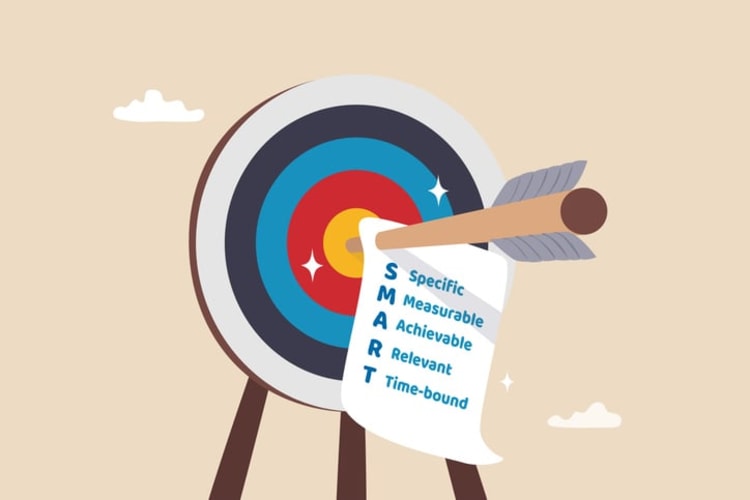Are you struggling to achieve your goals despite your best efforts? The key to success is breaking them into clear, actionable steps that you can track and accomplish. In this guide, we’ll explore practical examples, highlight the benefits of structured goal setting, and share inspiring ideas to help you turn your ambitions into reality.
Key takeaways
- Set ambitious goals and measure progress with the SMART goal framework to achieve success.
- Boost communication, productivity & project management skills by learning how to set goals that are measurable and actionable.
- Overcome challenges of SMART goal setting with determination & a positive mindset!
- Insightful SMART Goals Examples and smart goal examples to help you in your goal setting.
What is the SMART goal framework

Do you find yourself setting vague goals that never materialize? It’s time to switch to SMART goals! SMART is a smart acronym that is composed of five components. These are:
- Achievable
- Time-bound
Not all goals are created equal. Using the SMART framework helps ensure your goals are effective and actionable.
This framework provides a clear roadmap to success while allowing you to measure your progress with tangible metrics. Creating SMART goals solidifies your objectives, making them clear, well-defined, and divided into manageable steps. The SMART framework guides you by providing a clear path to break down complex objectives, set measurable targets, and track your progress. When you set goals, it’s essential to understand what makes a goal important to you. This guarantees your goals are relevant and meaningful, keeping you motivated. This approach helps you focus on the right direction, make necessary adjustments, and work towards your goals within a specific time frame. Here is a complete guide to the SMART framework.
Whether you’re setting professional or personal goals, the SMART framework can be a game-changer in your life. Examples of these goals can be found in various aspects of life, including:
- Improving communication skills
- Establishing healthy morning routines
- Increasing productivity at work
- Losing weight and maintaining a healthy lifestyle
- Saving a specific amount of money each month
This powerful tool enables you to convert ambitious goals into tangible results.
Professional SMART goals examples

In the professional realm, setting SMART goals can demonstrate your commitment to progress and willingness to invest time and effort in reaching your goals. Setting SMART goals also supports ongoing professional development by providing a clear framework for skill improvement and career growth.
For example, you might set performance goals to improve your job performance and position yourself for career advancement or recognition. Another effective professional SMART goal is to expand your professional network by attending industry events or connecting with peers, which can open doors to new opportunities.
Let’s explore some examples of professional SMART goals that can help you enhance your communication skills, boost productivity, advance your project management abilities, and share knowledge through mentoring or training others.
Enhance communication skills

Effective communication is crucial in any profession. To improve your communication skills, consider attending workshops, practicing active listening, and seeking feedback from colleagues.
For instance, you can join a Toastmasters club to refine your public speaking skills and deliver at least three speeches within the next six months. To polish your written communication, attend a business writing workshop and challenge yourself to write a concise and persuasive email each week.
Setting specific and measurable goals allows you to gradually enhance your communication skills, enabling you to become a more influential professional.
Boost productivity
Maximizing productivity is essential for professional success. To increase your productivity, start by setting daily priorities and utilizing time management techniques like the Pomodoro technique, where you break down work into 25-minute intervals followed by short breaks.
Eliminating distractions is another key aspect of boosting productivity. Concentrating on the current task and avoiding unimportant activities propels you forward towards your professional SMART goals. Track your time spent and measure your progress to ensure that you are moving forward.
By tracking your productivity, you can identify areas for improvement and set new goals, whether for the next year or for your ongoing development.
Advance project management abilities
Developing your project management skills can open doors to career growth. Obtaining certifications such as PMP, CAPM, or PRINCE2 can showcase your expertise and boost your credibility. Consider setting a SMART goal to complete an online course in project management within the next two months to demonstrate your commitment to professional development. For example, a project manager might set a goal such as: "Complete a Google Search Ads online course within the next two months to improve digital project delivery skills." To further enhance your skills, learn to use project management software like Microsoft Project, Trello, or Asana to stay organized and on track with your projects.
Additionally, leading small-scale projects can provide invaluable experience and bolster your confidence. Establishing SMART goals in project management paves the way for ongoing success in your career.
Personal SMART goals examples

Setting personal own smart goals can help you reach your highest potential in various aspects of your life, from health to relationships, by focusing on each relevant goal. While smaller daily habits are important, it’s also essential to pursue bigger goals such as learning emotional regulation, overcoming procrastination, or improving your mindset. Setting SMART goals that align with your personal interests can further enhance motivation and fulfillment.
In this section, we’ll explore some inspiring examples of personal SMART goals, including establishing a healthy morning routine, strengthening family bonds, and improving study habits. Opportunities for personal growth can be found in everyday life, making it possible to adapt and develop through your daily routines and activities.
Establish a healthy morning routine
A healthy morning routine can set the tone for your entire day. To create an invigorating morning routine, consider incorporating exercise, meditation, and a nutritious breakfast into your day.
Start by setting a goal to stick to this routine for six months, ensuring that the goal is achievable and measurable. Allocating time each morning to your physical and mental well-being lays the groundwork for a productive and fulfilling day.
Strengthen family bonds
Family relationships play a crucial role in our emotional well-being. Support and encouragement from family members are essential when working towards personal goals, as they can provide motivation and help you stay on track. To strengthen family bonds, set specific goals such as scheduling regular family dinners, participating in shared activities, and improving communication. Make sure these goals are achievable and relevant to your family, and set a timeline for achieving them.
Concentrating on nurturing and bolstering family ties cultivates a loving and supportive environment, enriching your life.
Improve study habits
Effective study habits are key to academic success. Enhance your study habits by setting aside dedicated study time, using effective learning techniques, and seeking help when needed.
Establish a specific goal, such as dedicating two hours each day to studying, and track your progress to stay motivated. Setting and accomplishing SMART study-related goals positions you on the path to improved grades and academic accomplishments.
Achieving your SMART goals
Reaching your SMART goals is a journey that requires dedication, focus, and persistence. Recognizing what you have achieved along the way is crucial for personal growth and motivation. In this section, we’ll discuss the importance of setting realistic deadlines, monitoring progress, and staying motivated throughout the process. Remember to focus on what truly matters to ensure your efforts align with your key priorities.
Setting realistic deadlines
When setting deadlines for your goals, it's essential to strike a balance between challenging and achievable time frames. Consider potential obstacles and allow for flexibility in your deadlines.
Break down larger goals into smaller, more manageable tasks, and set deadlines for each task to stay on track and maintain momentum. Establishing realistic deadlines increases the likelihood of achieving your SMART goals and reaping the rewards of your efforts.
Monitoring progress
Regularly tracking your progress is crucial for staying on track and making necessary adjustments to your approach. Set milestones and measure progress against them to ensure you're moving in the right direction. You can leverage tools such as spreadsheets, calendars, and project management software to help you track progress and stay organized.
Maintaining vigilance and proactive behavior helps you surmount any obstacles and accomplish your SMART goals.
Staying motivated
Maintaining motivation is key to achieving your SMART goals. Celebrate small victories and reward yourself for progress, which can provide a sense of accomplishment and encourage continued effort.
Seek support from others, such as friends, family, or mentors, who can provide guidance and encouragement along the way. Remind yourself of the benefits of achieving your goals and the positive impact it will have on your life.
Through commitment and persistence, you can realize your attainable goals, also known as SMART goals, by learning to write goals effectively.
Adapting SMART goals for different life areas

The versatility of the SMART goals framework, which includes criteria, makes it applicable to various aspects of your life, from career to personal relationships. By adapting the framework to suit your specific needs, you can unlock success in all areas of your life, ensuring a balanced and fulfilling journey towards your goals.
Whether you're working on professional goals like enhancing communication skills or personal goals like strengthening family bonds, the SMART framework can help you stay focused and motivated. Applying these principles across various life areas establishes a solid foundation for success, transforming your dreams into reality.
Overcoming challenges in SMART goal setting
Setting SMART goals is not without challenges. You might encounter a lack of clarity, commitment, and resources when setting your goals. However, with the right mindset and determination, these obstacles can be overcome. Recognizing potential obstacles and adjusting your approach can help you stay on track and committed to your objectives.
Breaking down your goals into smaller steps, establishing attainable deadlines, and concentrating on the process over the outcome helps maintain motivation and facilitates the achievement of your SMART goals. Remember to celebrate your successes and reward yourself for progress, which will help you maintain momentum and ultimately reach your goals.
Summary
Setting SMART goals helps turn personal and professional ambitions into clear, achievable plans. By defining goals that are specific, measurable, relevant, and time-bound, you create structure and direction that make it easier to take action and stay focused. This approach supports meaningful progress across key areas of life, including career development, financial stability, personal growth, and relationships.
Goal setting is not a one-time task but an ongoing process of planning, tracking progress, celebrating small wins, and adjusting as your priorities evolve. With consistency, reflection, and commitment, SMART goals help you build momentum, develop new skills, and create lasting improvements in both your work and personal life.
Frequently asked questions
SMART goals are specific, measurable, achievable, realistic and time-bound objectives that provide a roadmap for a targeted outcome. Examples of SMART goals could be "doubling sales from the current rate" or "achieving a quantifiable objective by a specified timeframe". By planning out these goals carefully and thoughtfully, individuals can track their progress and set themselves up for success.
SMART goals are specific, measurable, achievable, relevant and time-bound objectives, such as reducing overtime from 150 hours per month to 50 with no increase in incident reports, running customer education webinars with at least 10 attendees and an 80% satisfaction rating, or increasing profits and efficiency while growing the business operation. By setting SMART goals, businesses can ensure that their objectives are clear and achievable. They can also track progress and measure success more easily. This helps to keep employees motivated and focused on the task at hand.
SMART goals can include increasing website traffic by a certain percentage in a set amount of time, closing a certain amount in sales, or even getting physically fit - like training to run a marathon with measurable progress. All of these are specific, measurable, attainable, and realistic goals that ensure success.
SMART goals are achievable, specific, and measurable objectives that can help you reach your long-term vision. Examples of SMART goals include studying more, writing regularly, reading more books, mastering emotions, exercising more, improving your diet, becoming more productive and managing time better.
An example of a SMART goal is "Every day this week, I will work on our new marketing site redesign from 8:30 – 10:30 am without interruption," whereas a non-SMART goal would be "I want to spend 2 hours each morning working on my most important task." SMART goals are specific, measurable, achievable, relevant, and time-bound. They are designed to help you focus on what you need to do to reach your goals. By setting a SMART goal, you can break down a large goal into smaller, more manageable tasks. This makes it easier to stay on track and achieve success.





